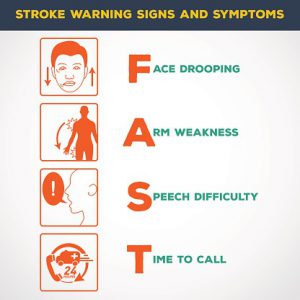 The easiest way to recognize the warning signs of a stroke is to think F.A.S.T. If someone you know is suddenly exhibiting the following signs, call 9-1-1 for help immediately:
The easiest way to recognize the warning signs of a stroke is to think F.A.S.T. If someone you know is suddenly exhibiting the following signs, call 9-1-1 for help immediately:
F- Face Drooping: If one side of the person’s face is drooping, ask them if their face feels numb and ask them to smile. You should be concerned if they are unable to smile or their smile is uneven.
A- Arm weakness: Does the individual’s arm feel numb or weak? Ask them to raise both arms and watch to see if one arm drifts downward.
S- Speech difficulty: If the person is trying to speak and they are difficult to understand or their speech is slurred, ask them to say a simple sentence, such as “my name is Jane,” repeatedly.
T- Time to call 9-1-1: You should never wait more than five minutes to call 9-1-1 if someone is displaying these warning signs.
Additional symptoms of a stroke are:
- Sudden confusion
- Severe headaches
- Blurred vision
- Dizziness
- Sudden loss of coordination
Stroke is one of the leading causes of death and long-term disability in the United States. Eighty percent of strokes are preventable and by spotting these warning signs and acting quickly, the severity of a stroke can be reduced drastically. during the month of May we are showing our support for stroke awareness and American Stroke Month through education. To speak with a medical professional about stroke prevention and care please call our ambulatory care unit at
During the month of May, Flushing Hospital is showing its support for stroke awareness and American Stroke Month by providing education to the communities it serves. To speak with a medical professional about stroke prevention and care please call our ambulatory care unit at 718-670-5486 or visit the National Stroke Association’s website at www.stroke.org.
All content of this newsletter is intended for general information purposes only and is not intended or implied to be a substitute for professional medical advice, diagnosis or treatment. Please consult a medical professional before adopting any of the suggestions on this page. You must never disregard professional medical advice or delay seeking medical treatment based upon any content of this newsletter. PROMPTLY CONSULT YOUR PHYSICIAN OR CALL 911 IF YOU BELIEVE YOU HAVE A MEDICAL EMERGENCY.
